Description
Carvedilol tablets are one of the products of Kish Medipharm Pharmaceutical Company, produced in doses of 6.25 mg, 12.5 mg, and 25 mg. Carvedilol is a beta-blocker used to control high blood pressure and chronic heart failure.
As mentioned, carvedilol tablets are one of the well-known beta blockers that are widely used to manage high blood pressure and heart failure. This drug works by blocking beta-adrenergic receptors in the heart and blood vessels, which leads to a decrease in blood pressure and improvement in heart function. Carvedilol is taken orally and should be taken regularly as directed by your doctor for best results.
The drug carvedilol helps reduce blood pressure and improve heart health by blocking beta-adrenergic receptors, blocking alpha-adrenergic receptors, and having antioxidant properties.
Uses of carvedilol tablets
Carvedilol tablets are produced by Kish Medipharm Pharmaceutical Company and are included in the category of heart medications. This pharmaceutical product is of interest to cardiologists and in many cases they prescribe carvedilol to their patients. Below we will discuss some of the uses of carvedilol tablets:
- Lowering blood pressure
- Antihypertensive
- Helping to treat chronic heart failure
- Improve angina pain
- Reducing the risk of heart problems
- Treatment of some heart rhythm disorders
- Atrial fibrillation or flutter
Tips on taking carvedilol tablets
Paying attention to simple tips regarding the use of carvedilol tablets will reduce side effects and unwanted problems. Below we will explain some important points in this regard:
- Avoid crushing, chewing, or breaking carvedilol tablets.
- If expired, dispose of this medicinal product properly with the help of your pharmacist.
- Avoid taking carvedilol tablets arbitrarily and stopping it suddenly.
- It may take up to 2 weeks for this medicine to take effect.
- The amount and dosage are based on the doctor's diagnosis, but this medicinal product is usually taken twice a day with or without food.
- If carvedilol has been prescribed to you, never recommend it to others.
- Carvedilol should be stored out of the reach of children at a temperature below 30°C and away from sunlight.
- If you forget a dose, avoid doubling it again, and if it is almost time for the next dose, go back to your previous routine at the same time.
- Carvedilol tablets do not treat blood pressure and can only be used in conjunction with diet, exercise, and weight control to control blood pressure.
- It is best to limit your intake of foods high in sodium and salt during carvedilol tablet treatment.
- Do not drink alcohol while taking carvedilol. Increased risk of low blood pressure, increased side effects, and effects on drug metabolism can be among the risks that can occur if carvedilol tablets and alcohol are taken simultaneously.
Contraindications for carvedilol tablets
Although carvedilol tablets are considered one of the most effective drugs in controlling blood pressure and heart failure, they are not recommended for all people with these problems, and to minimize side effects and irreparable risks, it is best to pay maximum attention to the contraindications for carvedilol tablets. Below, we will discuss the main contraindications for carvedilol:
- Hypersensitivity to carvedilol or any of the formulation components
- Acute decompensated heart failure
- Severe liver diseases
- Non-allergic bronchospasm diseases
- History of anaphylactic reaction
- Pregnancy and breastfeeding
- Sick Sinus Syndrome
- Untreated pheochromocytoma
- Asthma or chronic obstructive pulmonary disease (COPD)
- Severe bradycardia (slow heart rate)
Carvedilol Tablet Drug Interactions
Drug interactions usually occur due to changes in the mechanism of action of drugs. Drug interactions of carvedilol tablets can lead to effects on liver and kidney function and effects on heart rate. Carvedilol can enhance the effects of antidiabetic drugs and increase the risk of hypoglycemia. Taking carvedilol tablets simultaneously with antiarrhythmic drugs such as amiodarone can cause a severe decrease in heart rate and other heart problems. Using carvedilol with drugs such as verapamil and diltiazem can increase the risk of hypotension and bradycardia.
Carvedilol Tablets Drug Interactions can occur due to different drug mechanisms, shared metabolic pathways, competition for carrier proteins, physiological effects, and personal and medical factors. Understanding these interactions and consulting with your doctor can help reduce the risks and improve the effectiveness of treatment. Carvedilol Tablets generally interact with the following drugs:
- Digoxin
- Nifedipine
- Amlodipine
- Verapamil
- Ribafloxacin
- Citalopram
- Flexestin
- Serotraline
- Diltiazem
- Atenolol
- Metoprolol
- Plavix
- Alasperan
- Mitomastine
- Cimetidine
- Ranitidine
- Propranolol
- Alprazolam
- Diazepam
- Warfarin
Side effects of carvedilol
Medicines are produced to prevent, improve and treat problems, but sometimes they may cause problems for the user. Carvedilol is no exception to this rule and has side effects. Below we will briefly mention some of the side effects of carvedilol tablets:
- Cardiac arrhythmia (slow heartbeat)
- Fluid retention and swelling
- Weight gain (due to fluid retention)
- Digestive problems, including diarrhea
- Sleep problems (insomnia or nightmares)
- Lowering blood sugar, especially in diabetic patients
- Respiratory problems and shortness of breath
- Dizziness and low blood pressure
- Seizures and fainting
- Weight gain
- Bronchospasm (contraction of the smooth muscles of the bronchial walls)
- Mood changes, including anxiety and depression
Conclusion
Carvedilol tablets, manufactured by Kish Medipharm Pharmaceutical Company, are available in doses of 6.25, 12.5, and 25 mg. This medication is mainly used to treat high blood pressure and heart failure. It helps lower blood pressure and improve heart function by blocking beta and alpha receptors in the nervous system.
Taking carvedilol requires attention to important points such as dosage, drug interactions, indications, contraindications, and regular monitoring of symptoms. Taking carvedilol tablets may require regular monitoring of blood pressure and heart function. Your doctor may prescribe periodic tests to assess the effects of the drug.
The use of carvedilol tablets should be done under the supervision of a physician and should not be based on general information. This description is for product introduction purposes only, and the final decision to use the drug should be made by the attending physician.

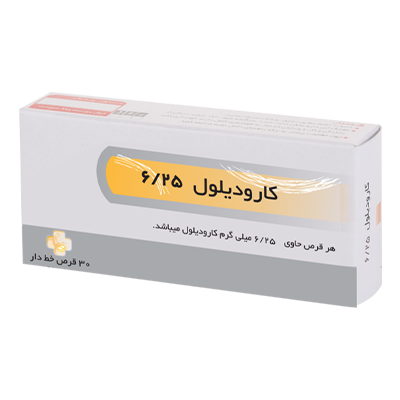
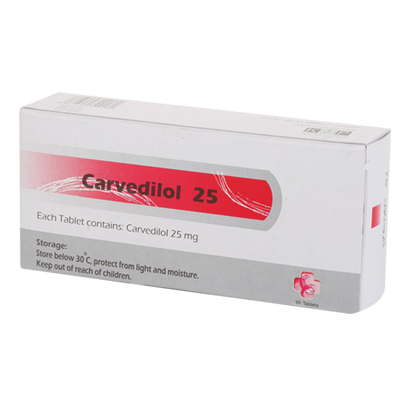
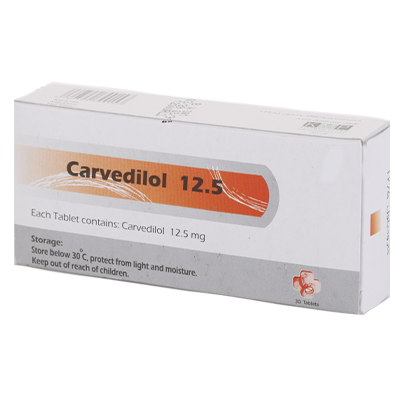
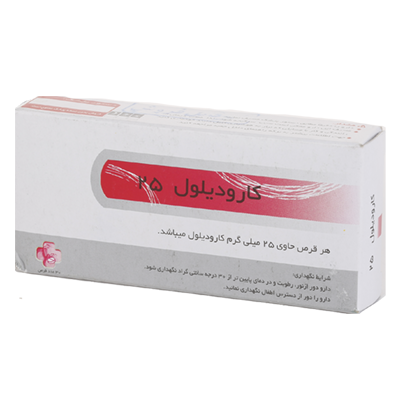
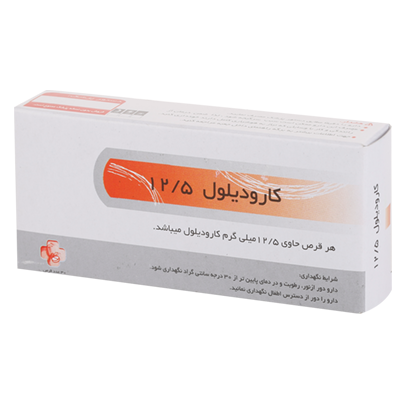
Reviews
There are no reviews yet.